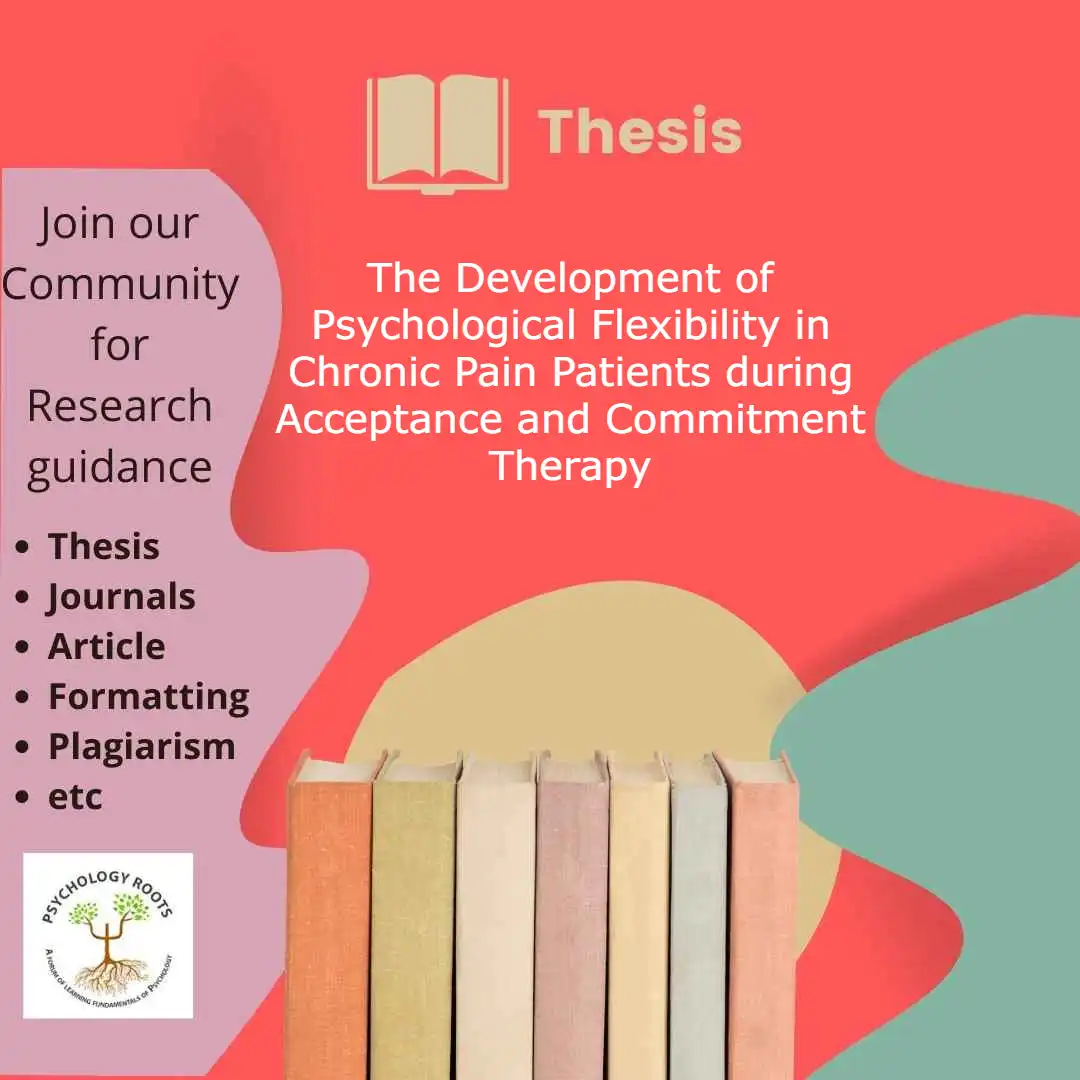Table of Contents
The Development of Psychological Flexibility in Chronic Pain Patients during Acceptance and Commitment Therapy
Here in this post, we are sharing the full Psychology thesis on “The Development of Psychological Flexibility in Chronic Pain Patients during Acceptance and Commitment Therapy“. You can read the abstract of the thesis with a download link. We have thousands of thesis in our collection (See articles). You can demand us any article related to psychology through our community, and we will provide you within a short time. Keep visiting Psychology Roots.
Abstract of the thesis
Background. Chronic pain is remarkably common. It causes problems for both the suffering individual and society. Common treatments, like pharmacological treatment, do not always help when it comes to chronic pain. The pain cannot be managed anymore and the experience of pain cannot be avoided. In fact, persistent attempts to avoid the pain can lead to maintenance and often even an increase in pain. Therefore, Acceptance and Commitment Therapy (ACT) does not lean on pain control, but on a valuable life with pain and limitations. ACT aims to increase psychological flexibility.
Aims. In this study, the aim was to examine the development of pain patients during an eight-week, ACT-based treatment. We wanted to take a closer look at the development of acceptance, values-based action and application of learned principles during this treatment to see how psychological flexibility develops. Another subject was to examine if patients experience a crisis during the treatment, as often seen by therapists.

The Development of Psychological Flexibility in Chronic Pain Patients during Acceptance and Commitment Therapy
Method. Five intensive single case studies were conducted to get a better understanding of how ACT works. The participants were chronic pain patients who took part in a three days a week inpatient treatment in the Roessingh Rehabilitation Center in the Netherlands. Starting in the second treatment week, interviews were conducted weekly during the eight treatment weeks. The interviews were taken accordingly to an interview scheme, with open questions. Follow up interviews were taken six weeks after the last treatment week. The interviews were scored on acceptance, values-based action and application on a scale from 1 to 5. The average of the three scales taken together was taken as the measure for psychological flexibility.
Results. A positive development in psychological flexibility and all three subscales has been found for all five patients. Each patient progressed in a unieque pattern, each development being different from the other. Three of the five patients went through a ‘crisis’ during treatment, all at different moments. The crisis had a postitive impact on the end result. Within four patients, psychological flexibility decreased in the follow-up interview compared to the interview in the last treatment week.
Conclusions. There has been found evidence that an eight-week ACT-based treatment helped patients to better accept their pain and pain-related limitations, to act upon their values and to integrate the principles they had learned during the treatment in their daily lives. The ACT treatment seems to be able to realize the aim to increase the psychological development of the patients. Thereby, every patient showed his own unique pattern of development.
Researcher of the Thesis
- Laura A. Weiss
Avail Thesis [sociallocker id=64051]
[/sociallocker]
Need help in Research:
Are you struggling in research? Don’t Worry, We provide you with complete guidance and support free and quickly. Just need to create a query in our community. We also offer paid services such as:
- Thesis writing
- Article writing
- Statistical analysis
- Reference according to APA
- APA Formatting
- Supervisions
- Courses and Training
Contact us for the best quality free and paid services. info@psychologyroots.com or (+92-3336800644)
Information:
The purpose of our website is only to help students to assist them in finding the best suitable instrument for their research, especially in Pakistan where students waste a lot of time in search of the instruments. It is totally free of cost and only for creating awareness and assisting students and researchers for good research. Moreover, it is necessary for you to take the permission of scales from their representative authors before use because copyrights are reserved by the respected authors.
Help Us Improve This Article
Did you find an inaccuracy? We work hard to provide accurate and scientifically reliable information. If you have found an error of any kind, please let us know.
Add comment. we appropriate your effort.
If you have any scale or any material related to psychology kindly share it with us at psychologyroots@gmail.com. We help others on behalf of you.
Follow